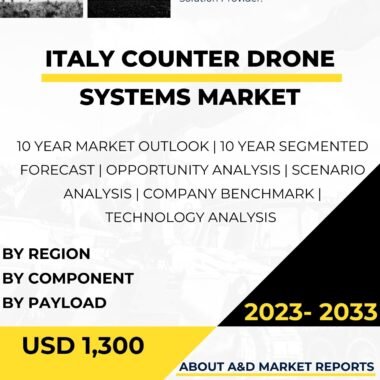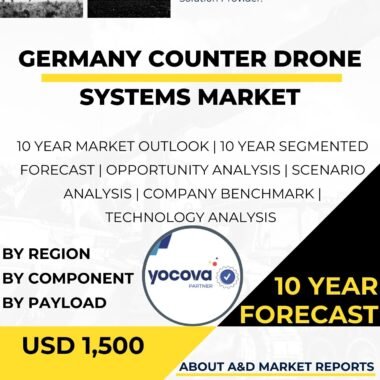Description
The India counter-drone systems market has emerged as a critical component of the country’s defense and security apparatus, driven by the rapid proliferation of commercial drones and the evolving threat landscape posed by their malicious use. Drones, once considered primarily for military applications, have now found widespread commercial and civilian use in various sectors, ranging from agriculture and logistics to filmmaking and surveillance. While this technology brings numerous benefits, it also presents new challenges, as unauthorized drones can be utilized for nefarious purposes, such as espionage, smuggling, and even terrorist attacks. To address these concerns, India has been actively investing in counter-drone technologies and solutions.
The rise of commercial drones in India has been marked by significant growth, owing to advancements in drone technology, ease of access, and reduced costs. The country has witnessed a surge in drone deployments for various applications, including monitoring crop health, delivering goods, conducting aerial surveys, and covering events. However, the proliferation of drones has also led to instances of unauthorized flights near sensitive locations, prompting the need for effective counter-drone measures.
The India counter-drone systems market encompasses a wide array of technologies, ranging from detection and identification to neutralization and defeat systems. The first line of defense involves the detection of unauthorized drone activity. Various detection technologies, such as radar, radio frequency (RF) sensors, and electro-optical/infrared (EO/IR) cameras, are deployed to identify drones operating in restricted airspace. Additionally, acoustic sensors and drone-specific signal databases aid in distinguishing between friendly and hostile drone signals.
Once detected, the next step is to identify the drone and its operator. This is achieved through sophisticated identification technologies, such as radio frequency fingerprinting and digital signatures. By identifying the operator, authorities can take appropriate action against unauthorized drone flights and mitigate potential security risks.
For effective countermeasures, India has been investing in a range of mitigation technologies to neutralize hostile drones without causing collateral damage. Non-kinetic countermeasures include jamming the drone’s communication links and GPS signals, forcing it to return to its operator or land safely. On the other hand, kinetic countermeasures involve the use of directed energy weapons or specialized ammunition to physically disable the drone in flight.
The India counter-drone systems market has witnessed significant contributions from both domestic and international defense companies. The Indian defense industry, backed by government initiatives like “Make in India,” has been actively engaged in developing indigenous counter-drone technologies. Private sector players, research institutions, and startups have also played a pivotal role in developing innovative solutions to address evolving drone threats.
Moreover, India has fostered collaborations with international partners to leverage their expertise in counter-drone technologies. Joint ventures, technology transfers, and strategic partnerships have facilitated access to advanced systems, accelerating the deployment of state-of-the-art counter-drone capabilities.
While the India counter-drone systems market presents lucrative opportunities, it also faces several challenges. The rapid evolution of drone technology demands continuous innovation in counter-drone systems to stay ahead of potential threats. Additionally, the crowded airspace in urban areas and near airports poses technical challenges in accurately detecting and neutralizing rogue drones without affecting legitimate operations.
Regulatory aspects also come into play, as counter-drone technologies need to comply with aviation and spectrum management regulations to avoid interference with legitimate drone operations. Striking a balance between ensuring security and privacy concerns is critical to establishing a robust counter-drone ecosystem.
Looking ahead, the India counter-drone systems market is expected to witness sustained growth. The continued proliferation of drones in both civilian and commercial domains will necessitate the deployment of comprehensive counter-drone solutions to protect critical infrastructure, sensitive installations, public gatherings, and defense establishments.
The Indian government’s focus on strengthening homeland security and defense capabilities, along with initiatives to promote indigenous manufacturing, will further drive the demand for locally developed counter-drone technologies. Collaboration with international partners will continue to play a vital role in accessing cutting-edge technologies and fostering knowledge-sharing in this rapidly evolving domain.
As the threat landscape evolves and drone technologies advance, the India counter-drone systems market will remain dynamic and responsive, playing a crucial role in ensuring national security and safeguarding public safety against the potential risks associated with unauthorized drone activities. With innovative solutions and strategic partnerships, India will continue to fortify its position as a leading player in the global counter-drone market.




